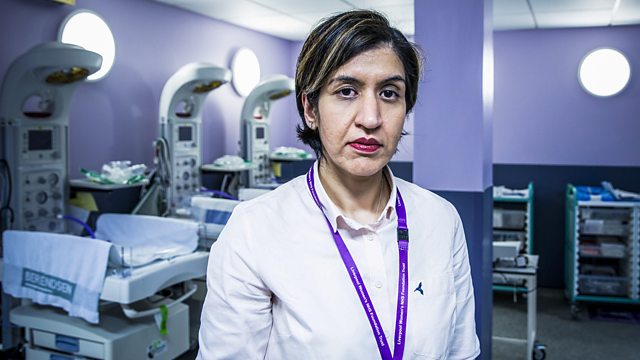
At the UK鈥檚 only specialist neurology hospital Trust, a doctor strives to secure groundbreaking treatment for patients with a misunderstood but common neurological disorder.
Filmed this winter, as A&E waiting times hit their highest ever recorded levels and the impact of exceptional demand is placing the NHS under severe pressure, Hospital is the story of the health service in unprecedented times.
Now in its fifth series, the award-winning Hospital returns to Merseyside to chart the day-to-day life of six NHS Trusts across Liverpool. The hospitals have a catchment area covering more than two and half million people, stretching beyond the city to North Wales, Cheshire and the Isle of Man.
Edited and broadcast within weeks of filming, this eight-part series captures the daily realities facing the NHS right now. Hospital brings audiences close to the issues and challenges that continually dominate the headlines.
In Accident and Emergency at the Royal Liverpool Hospital, a woman is brought in by ambulance after experiencing an unexplained seizure, one of 1,400 the emergency department will see this year. As seizures can be a warning sign of a complex brain condition, patients like this will be referred onto a neurological specialist to determine what has caused this episode. At least one in nine people who present to A&E with seizures have symptoms of FND.
The Walton Centre in Liverpool is the country鈥檚 only dedicated neurosciences hospital Trust, providing neurology, neurosurgery, spinal and pain management services. Every year, over 3,000 patients are referred to the neurology clinics here with a condition that can cause seizures but which is still misunderstood among medical professionals: functional neurological disorder (FND).
Although 66-year-old Pauline has been left severely disabled by her FND, like in all other cases, there is nothing physically wrong with her body. Instead, the shocking seizures Pauline experiences, and which can take hold without warning, may be linked to psychologically traumatic events in her past.
Functional neurological disorder is little-known and often misunderstood by clinicians, so patients are sent for unnecessary tests and scans to look for other conditions like multiple sclerosis and epilepsy. A study found the annual cost to the NHS of patients with symptoms of somatic disorders, like FND, could be up to 拢3 billion. In fact, FND is the second most common reason for referral to a neurologist but can take an average of over three years to accurately diagnose. However, despite the costs of misdiagnosis, there is a chronic shortfall of funding nationally to address the problems posed by FND, and treatment options are limited. Neurologist Dr Chrissie Burness started an FND service at the Walton Centre in 2012 and is one of a handful of doctors in the country specialising in the condition. Chrissie is an epilepsy specialist but now has a 17-month waiting list of the most seriously affected patients with FND, desperate for her help.
David, a 38-year-old former window cleaner with FND, has been unable to walk more than a few steps for more than a year. Chrissie thinks he could benefit from a trial of specialist physiotherapy which the Walton Centre is facilitating. Engaging with physiotherapy will be challenging for David, whose seizures can last more than five hours and render him unable to speak or move. But the intensive treatment could help him to achieve his goal of walking without assistance. However, unless the Trust supports funding a physiotherapist once the trial finishes, David could be one of the last to undergo this groundbreaking treatment.
In order to protect the interests of patients like David, Chrissie must put together a case to recruit a specially trained physiotherapist to her team once the trial ends. It needs to be supported by the Trust in a time of belt-tightening which has led to tough decisions being made throughout the NHS.
At Liverpool Women鈥檚 Hospital, 29-year-old Tara is seven months pregnant. She also has had a type of FND called intermittent functional weakness, as well as shooting pains throughout her entire body since being hit by a car six years ago. With the birth imminent, doctors are unsure how Tara鈥檚 condition will affect her during labour.
Shown from multiple perspectives, audiences witness the complexities of the dilemmas and decision-making, which happen every day for consultants, surgeons and managers, and the impact these decisions have on patients.
Against the backdrop of historic demands stemming from limited resources, increasing patient numbers and social care at full stretch, the series shows the extraordinary work of some of Liverpool鈥檚 20,000 NHS hospital staff as they push the boundaries of what is possible with world-class, cutting-edge treatments and life-saving operations.
Hospital is a co-production with the Open University.
Last on
Credits
| Role | Contributor |
|---|---|
| Executive Producer | Jackie Waldock |
| Series Producer | Meghan Just-Truelove |
| Series Producer | Kate O'Hara |
| Editor | Mark Rossiter |
| Executive Producer | Lorraine Charker-Phillips |
| Executive Producer | Simon Dickson |
| Production Company | Label 1 |
| Executive Producer | Eric Harwood |
Explore extensive resources and information on healthcare and nursing with The Open University
Visit the Open University website.
